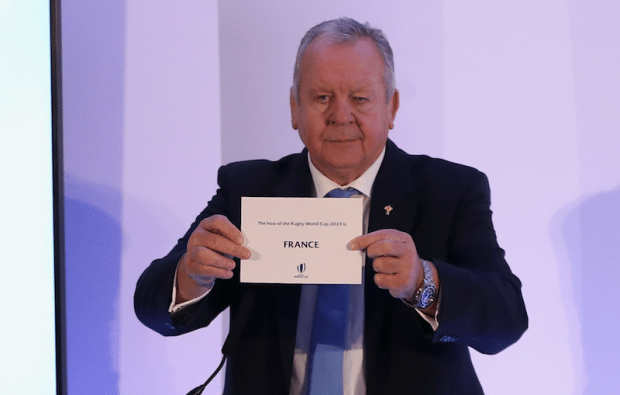The decision to award France the 2023 Rugby World Cup has robbed South Africa of a golden opportunity and made a mockery of World Rugby’s selection process, writes JON CARDINELLI.
The press conference doors opened a full two hours before the unveiling of the 2023 host nation in London on Wednesday. As rugby journalists from around the world poured into the venue, one got the sense that something was horribly and fundamentally wrong.
Notes were compared. Some said that the voting unions would honour World Rugby’s recommendation and give South Africa the green light. More than a few, however, felt that France would score a shock win in the 2023 bid race.
The fact that the matter was being discussed at that late stage spoke volumes. Some predicted that many of the unions would vote against South Africa, and by extension against World Rugby.
Sadly, that is exactly what came to pass as World Rugby chairman Bill Beaumont announced that France would host the 2023 World Cup.
The French media pack greeted the decision with unabashed cheers. One journalist began to whistle the tune to ‘La Marseillaise’.
Bernard Laporte and his bid team – which included former France players Freddie Michalak and Sébastien Chabal – chanted ‘Allez le Bleus!’ while posing for photographs.
The rest of the media contingent – and going by the social media reaction, a significant number of fans and stakeholders from around the world – wanted to know what the result said about World Rugby.
World Rugby spent a great deal of money to employ an independent team of professionals. The respective bids were analysed and evaluated in a seemingly transparent manner. It appeared as if they were trying to make the best decision for the sport.
In the end, however, it came down to votes. France finished second in the evaluation process, but won 24 of the 39 votes on offer.
What a waste of time. What an insult to those – read SA Rugby – who endeavoured to follow World Rugby’s process.
Beaumont’s reaction to the suggestion that World Rugby had been ‘humiliated’ by the outcome was disappointing.
The World Rugby chairman praised the process in his opening address to the media. Either he didn’t understand how bad this outcome was for the governing body or he simply didn’t want to.
The questions will continue to come in the wake of this debacle, though. The leadership and the integrity of World Rugby will continue to be scrutinised, and not just by those from the nations who finished behind France. Indeed, what reason does anyone have to believe that the next bidding process will be fair and transparent?
South Africa needed this good-news story just as it needed it back in 1995. South African rugby’s revival and its development of players and structures would have been boosted by another global tournament in the country – as CEO Jurie Roux pointed out after the announcement on Wednesday.
‘Where to now?’ Roux was asked.
South Africa will bid for the 2027 tournament, he said. At the same time, he gave the impression that neither he nor SA Rugby president Mark Alexander will subject themselves to this sham of a process again.
ALSO READ: Rules were broken – Alexander
The weather in London on Wednesday was bleak. The mood inside the press room after the announcement was even bleaker.
France were the big winners on Wednesday and may indeed go on to host a great World Cup in 2023. The question that will persist over the next few weeks and indeed over the next six years is whether they truly really deserve this opportunity.
These are dark times for South African rugby, and it will take something special to bring the Boks and the respective Super Rugby teams back into the light.
After what transpired on Wednesday, however, one could say that these are dark times for the sport as a whole and that changes to its leadership are needed sooner rather than later.
Photo: David Rogers/Getty Images





